
Vomiting: When Should You Be Concerned?
All babies spit up small amounts of milk quite frequently, usually right after a feeding. This is nothing to worry about. Real vomiting can, however, be a cause for concern. Throwing can quickly dehydrate a young baby, so keep an eye on wet diapers and make sure that the baby's lips are not drying out. Call your pediatrician if your baby has been vomiting for more than 24 hours. Take your baby to the ER if the vomit contains a significant amount of blood, or is green from bile. The same rule applies if the baby appear in pain, has a swollen and tender tummy, and if your baby has fallen on her head — in which case vomiting can indicate a concussion. Are you at all suspicious that your baby could have ingested a poisonous substance like cleaning materials? Call your emergency service number right away.
- Important notification about information and brand names used in this slideshow!
- Photo courtesy of Ben Earwicker by shc.hu : www.sxc.hu/photo/916203
- www.dad.info/health/your-child-s-health/common-baby-illnesses
- http://www.babycenter.com/0_vomiting_9955.bc
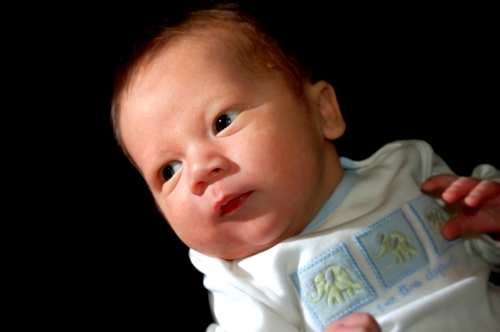
Watch Out For Dehydration If Your Baby Has Diarrhea
Infant stools are usually soft, and will be mustard yellow if the baby is breastfed. So, what does baby diarrhea look like? If it's a different color, has an even looser consistency, and the bowel movement ends up all over the diaper area, it is probably diarrhea. Babies with diarrhea will also need to “go” much more frequently than they normally do. If your baby has a fever, a viral or bacterial infection is most likely to be the culprit. Call your pediatrician if you are worried, or if your baby has had diarrhea for longer than 24 hours. Be especially cautious if your baby is also vomiting, and is thus at a double risk of getting dehydrated. Babies that appear to be otherwise healthy may have a food allergy or intolerance — try eliminating suspect foods to see if the baby's stools improve.
- Important notification about information and brand names used in this slideshow!
- Photo courtesy of Ben Earwicker by sxc.hu : www.sxc.hu/photo/625085
- www.dad.info/health/your-child-s-health/common-baby-illnesses
- http://www.askdrsears.com/topics/skin-care/diarrhea
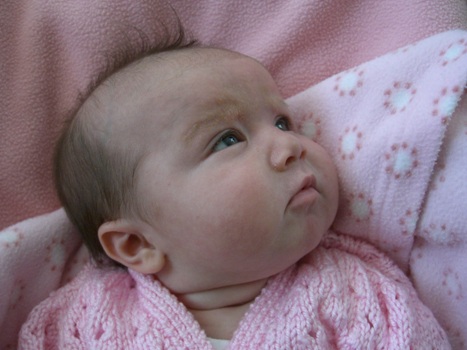
Constipation: What To Do If Your Baby Can't Poo
Constipation in infants is, contrary to popular belief, not diagnosed by looking at the frequency of bowel movements. Some babies only have a bowel movement once every three days without being constipated. Hard and compact stools that are difficult to pass are what points to constipation. Your baby may have that characteristic “pooping” face while grunting. Breastfed babies are less likely to become constipated than formula-fed babies. If your formula-fed baby is constipated, try switching to a different brand and also give your baby an additional bottle of water. Babies over six months, who are already eating solid, will benefit from eating more fiber-rich vegetables. Broccoli and beans are good examples of these.
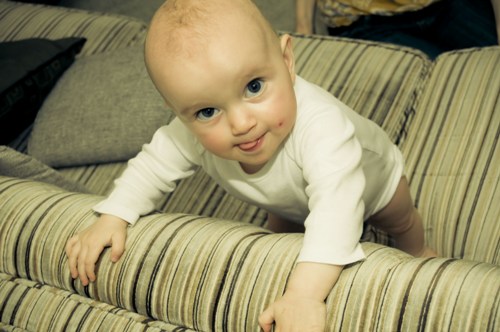
How To Handle A Fever
Fever is a big worry for many new parents. Before you panic, do remember that fever is merely the body's natural defense against infection: germs have a much harder time surviving at this higher temperature. Fever, in short, shows that your baby's immune system is working. In most cases, there is no need to rush to the doctor. Offering fever reducers in accordance with your pediatrician's previous advice is a good course of action. Give your doctor a call during office hours if the fever persists, and go in for an evaluation only if they deem it necessary. There are some notable exceptions, however. Babies of six weeks old or younger who have a fever of 101 degrees Fahrenheit or higher should receive medical attention immediately — take your baby to the ER if you have to. If your baby is slightly older, between six weeks and three months, you should still make sure he or she is seen by a doctor within a few hours if the thermometer indicates a fever of 101 degrees Fahrenheit or up. If your infant is older than three months and has a fever of over 104 degrees Fahrenheit that does not quickly come...
Fever is a big worry for many new parents. Before you panic, do remember that fever is merely the body's natural defense against infection: germs have a much harder time surviving at this higher temperature. Fever, in short, shows that your baby's immune system is working. In most cases, there is no need to rush to the doctor. Offering fever reducers in accordance with your pediatrician's previous advice is a good course of action. Give your doctor a call during office hours if the fever persists, and go in for an evaluation only if they deem it necessary. There are some notable exceptions, however. Babies of six weeks old or younger who have a fever of 101 degrees Fahrenheit or higher should receive medical attention immediately — take your baby to the ER if you have to. If your baby is slightly older, between six weeks and three months, you should still make sure he or she is seen by a doctor within a few hours if the thermometer indicates a fever of 101 degrees Fahrenheit or up. If your infant is older than three months and has a fever of over 104 degrees Fahrenheit that does not quickly come down with fever reducers, you need to get in touch with your doctor as soon as possible. Watch out for meningitis symptoms including a stiff neck, vomiting, coughing, and irritable reactions to light as well.
- Important notification about information and brand names used in this slideshow!
- Photo courtesy of Ben Earwicker by sxc.hu : www.sxc.hu/photo/1327887
- www.askdrsears.com/topics/parenting/childhood-illnesses/fever

Common Colds And Blocked Noses
Young children are far more susceptible to common colds than adults are, because their immune systems are not fully developed yet. The odds are that your baby will come down with a cold at some point, and that the cold will be accompanied by a low-grade fever. Colds are rarely serious, but parents can make their children feel more comfortable by using a nasal decongestant and offering fever reducers if their temperature is slightly raised. Make sure your child drinks plenty of fluids. When should you seek medical advice? If your baby is younger than three months and has a fever of 101 degrees Fahrenheit or more, if cold symptoms persist longer than ten days, or if your child appears to have breathing difficulties. Colds that seems to be getting worse rather than better, nasty coughs, and green or yellow phlegm also need to be evaluated by a doctor. Babies who keep pulling on their ear may have an ear infection, which would definitely need medical attention.
- Important notification about information and brand names used in this slideshow!
- Photo courtesy of magfan by sxc.hu :
- www.sxc.hu/photo/875137
- http://www.nhs.uk/Conditions/Cold-common/Pages/Commoncoldinchildren.aspx
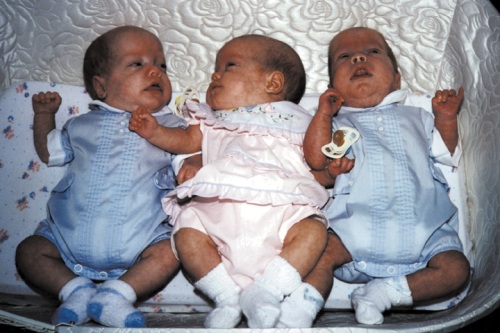
Treating Diaper Rash
Diaper rash is a painful, red rash on your baby's bottom. It can have a variety of causes. Wet and soiled diapers that weren't changed on time is a common reason babies develop diapers rash, but it can also be due to more serious issues. If you frequently change your baby's diapers, diapers rash may be due to an allergic reaction to the diapers you are using, or your baby could have a food intolerance or infections like thrush. Bathing your baby in water with a good amount of baking soda is a great home remedy, and talc powder keeps the skin dry as well. If your baby's skin is bleeding, she has blisters, or she appears to be in pain, then it is time to call your doctor. Diaper rash that doesn't go away with the simple home treatments mentioned above may need medical attention to figure out what is causing their diaper rash.
- Important notification about information and brand names used in this slideshow!
- Photo courtesy of ba1969 by sxc.hu : www.sxc.hu/photo/1024776
- www.sheknows.com/parenting/articles/841637/5-common-baby-illnesses
- http://www.trying-to-conceive.com/family/parenting/do-you-need-to-see-a-doctor-for-diaper-rash/

Soothing Your Baby's Colic
Defined as excessive crying without an apparent cause, colic is still a mystery to the medical profession and a nightmare for parents. You could see your doctor about your baby's crying if she cries more than three hours a day, for long periods of time. The chances are that your pediatrician isn't going to give you advice that will actually make the crying stop, unfortunately. There are some things you could try at home. Some parents find that feeding their baby smaller amounts more frequently improve their baby's colic. If you are formula feeding, do not change the feeding schedule without consulting your pediatrician, but go right ahead and experiment if you are nursing. Movement can be therapeutic for colicky babies too, so try laying your baby on his back and making "cycling" motions with his legs. Do consider the possibility that your baby's colic is in fact due to a food allergy. A 2007 study showed that 95 percent of participating colicky babies stopped having colic once cows' milk was eliminated from their diet. Breastfeeding mothers can test if this will work for their baby too by avoiding cow's milk and dairy products for a while. Baby formula without...
Defined as excessive crying without an apparent cause, colic is still a mystery to the medical profession and a nightmare for parents. You could see your doctor about your baby's crying if she cries more than three hours a day, for long periods of time. The chances are that your pediatrician isn't going to give you advice that will actually make the crying stop, unfortunately. There are some things you could try at home. Some parents find that feeding their baby smaller amounts more frequently improve their baby's colic. If you are formula feeding, do not change the feeding schedule without consulting your pediatrician, but go right ahead and experiment if you are nursing. Movement can be therapeutic for colicky babies too, so try laying your baby on his back and making "cycling" motions with his legs. Do consider the possibility that your baby's colic is in fact due to a food allergy. A 2007 study showed that 95 percent of participating colicky babies stopped having colic once cows' milk was eliminated from their diet. Breastfeeding mothers can test if this will work for their baby too by avoiding cow's milk and dairy products for a while. Baby formula without cows' milk is also available, but do talk to your baby's doctor before switching to such a formula.
- Important notification about information and brand names used in this slideshow!
- Photo courtesy of Ben Earwicker by sxc.hu : www.sxc.hu/photo/911204
- www.sheknows.com/parenting/articles/841637/5-common-baby-illnesses
- http://www.trying-to-conceive.com/family/parenting/comforting-colic-in-babies/
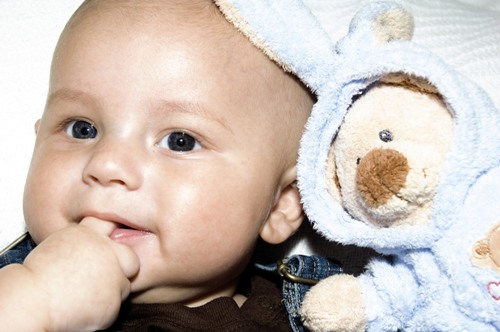
Oral Thrush: Harmless But Painful
Thrush is a yeast infection caused by the fungus Candida Albicans. Oral thrush manifests in a baby's mouth as white patches, and affects his feeding habits. Young babies can develop thrush after receiving antibiotics, but more commonly get it from their mothers. While thrush isn't dangerous, it is certainly very uncomfortable. Thrush will usually go away on its own, and some doctors do recommend expectant management, or waiting for the infection to clear from the baby's system on its own. Breastfeeding moms whose babies have oral thrush will often notice that they have thrush on their nipples, though. Since thrush can be transferred back and forth between mom and baby, it is best to see your pediatrician for some antifungal drugs.
- Important notification about information and brand names used in this slideshow!
- Photo courtesy of Ben Earwicker by sxc.hu : www.sxc.hu/photo/916207
- www.dad.info/health/your-child-s-health/common-baby-illnesses
- http://www.trying-to-conceive.com/family/parenting/oral-thrush-and-your-newborn/
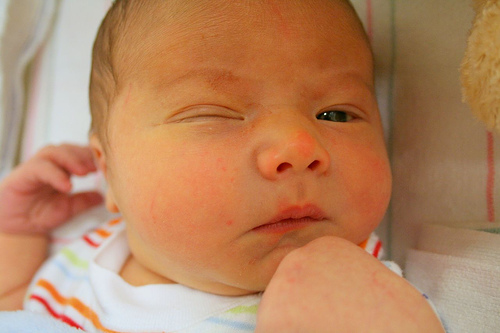
Conjuctivitis — A Blocked Tear Duct Or Something More Serious?
Conjuctivitis, also known as pink eye, is the most common eye infection in children. It is completely harmless in the vast majority of cases. Causes include a blocked tear ducts, allergens, and infections. The latter is most serious, since some sexually transmitted diseases lead to types of conjuctivitis that can make the baby go blind. This is why hospitals administer eye drops to newborns routinely. Yellow-ish discharge, crusty eye lids, and red and swollen eyes are the tell-tale signs. If your baby has them, you are probably dealing with a blocked tear duct and have no reason to worry at all. If there is any chance that you had an STD while you were pregnant, and this was not diagnosed, do see a pediatrician right away.
- Important notification about information and brand names used in this slideshow!
- Photo courtesy of Mike Schmid by Flickr : www.flickr.com/photos/mikeschmid/482342852/
- www.dad.info/health/your-child-s-health/common-baby-illnesses
- http://www.cdc.gov/conjunctivitis/newborns.html











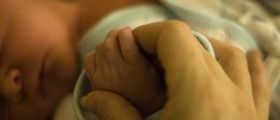

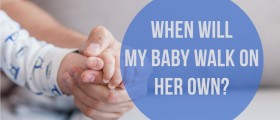
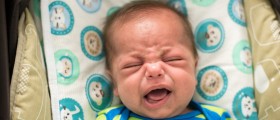


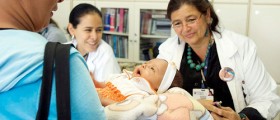


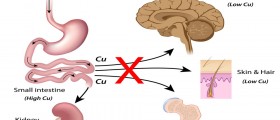

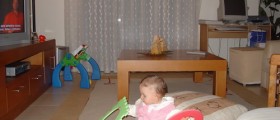


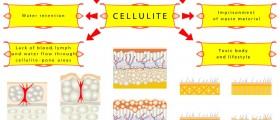
Your thoughts on this
Loading...